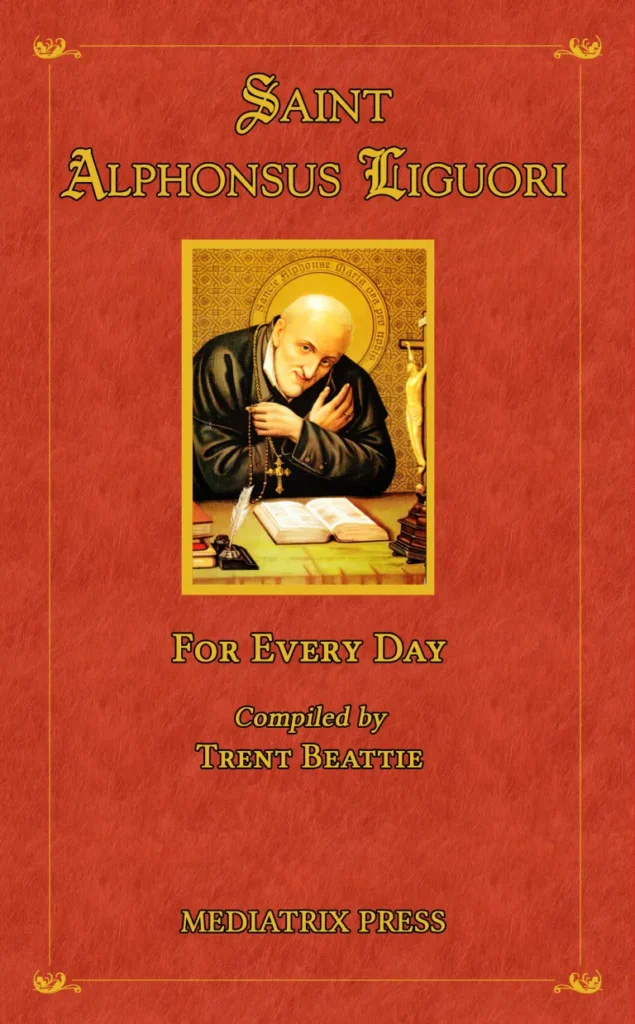Many people think of prayer as a pleasant pastime, an eccentric extra, or a holy hobby. They take it as a vague and poetic view of communication with God, as if there were no objective standards. Prayer is seen as subjective, feelings-based, and even possibly a waste of time—but, hey, if you like it, then go for it.
This assessment is woefully inaccurate and highly damaging, St. Alphonsus Liguori would say. For the 18th century founder of the Redemptorists, the choice to pray or not to pray is literally what determines whether a soul ascends to Heaven or descends to Hell.
While studying the Faith is necessary, it will not, by itself, produce holiness. The same is true with good works in general and reception of the sacraments specifically. Indeed, the very definition of “good works” will vary from person to person, based on whether or not prayer is employed to open up and take hold of God’s grace. The term “good works” can be so distorted that even evil works are touted as good by those who do not pray.
In the theoretical case that all of one’s “good works” were indeed good, there would still be bad works (sins) that the person would not have the grace to refrain from committing, because he did not pray. A moral accounting of his life would be a matter of good, bad, good, bad, good, bad—and the good would not be produced by God’s will and grace, but by that person’s own natural judgment.
As for sacramental reception specifically, what kind of Confession would be conducted without prayer? What kind of Holy Communion would occur without prayer? What kind of marriage would be contracted without prayer? Participation in these sacraments would be disfigured to the degree that the soul lacks relationship with God.
Something in addition to good works is needed to attain salvation, and St. Alphonsus tells us that this great means is prayer. Indeed, Great Means of Salvation and Perfection was the title given to his book on the topic of prayer—a book that he wanted to get into the hands of every Catholic in the world.
Books of Lamentations
Not long ago, I would lament the fact that the only copies of Great Means of Salvation were the small, pulp versions from Our Blessed Lady of Victory Mission of the 1980s. These copies have done much good for souls, but my expectation that “mainstream” publishers would pick up on this reality was not met.
Even with the flourishing of traditional books in the past decade, I continued to lament the disinterest in the works of St. Alphonsus. Not only was Great Means nowhere in sight, but neither were two of his other top works, Dignity and Duties of the Priest and The True Spouse of Jesus Christ. It was as if we had gone back to the early days of the Italian Doctor of the Church’s writings (in the mid-1700s) when he paid to have his books printed—a common practice then.
Then Mother of Our Savior and Refuge of Sinners Publishing brought True Spouse back in 2015 and Sophia Institute Press brought Great Means back in 2021 (renamed Prayer: Great Means of Salvation and Perfection). Both look a little larger, sturdier, and more presentable than their 1980s counterparts, and the latter, though edited down, adds meditations and advice on vocational discernment, making the book more readable.
Pray without Ceasing or Cease without Praying
A good priest once stated in a Sunday sermon that whenever he heard of a brother-priest leaving the active ministry (the priesthood itself cannot be left), his first question was “When did you stop praying?
Those formerly in ministry (who were legitimately called to it) can trace their departures to lack of prayer. In fact, all Christians can trace all departure from virtue (in other words, sin) to lack of prayer. Even someone who diligently studies the faith and receives the sacraments will fall into errors about both.
He will shape Catholicism to fit his own dispositions, rather than the other way around. This is because simply knowing the Faith is not enough to live it; living it in its entirety is not possible without the continual flow of grace into the soul through prayer that makes transformation in Christ possible.
St. Alphonsus teaches, along with the Council of Trent, that some parts of the Law of God are impossible to keep without praying, yet the whole Law is very keepable with prayer. Furthermore, the patron of moralists and confessors tells us that prayer is not only possible, but easy, and it, in turn, makes salvation not only possible, but easy.
Because God is more than happy to come to our aid, our road will become smoother—either by the removal of struggles, challenges, and temptations, or with the strength needed to overcome them. With grace obtained through prayer, things that were once seen as major issues will show themselves to be stepping stones toward eternal felicity.
In order to obtain this help, it is not necessary to climb a mountain, forge a stream, build a tower, or even go to the church down the street. Prayer can be done anywhere—and literally without lifting a finger. This ease eliminates all excuses about not being able to keep God’s Law.
Those who do not ask for help will not be helped. Instead of praying without ceasing, they, quite sadly, cease without praying. In True Spouse, which has a chapter summarizing his teachings in Great Means, St. Alphonsus wrote, “St. Philip Neri used to say, ‘A religious without mental prayer is a religious without reason.’ I add: she is not a religious, but the corpse of religious.” This can also be applied to priests and laity.
Emphatic and Systematic
As St. Alphonsus famously wrote in Great Means: “He who prays is certainly saved; he who prays not is certainly damned.” Could he be any clearer? And yet, the same saint lamented the fact that so few leaders in the Church emphasized the incalculable importance of prayer, the great means of living virtuously to the end.
Some of today’s leaders have maintained the necessity of prayer—most notably those who assembled the Catechism of the Catholic Church. Paragraph 2744 starts out with this punchy sentence: “Prayer is a vital necessity” [emphasis in original]. Later on in 2744, St. Alphonsus is quoted as above, with only a slight adjustment.
Several million copies of the Catechism have been sold, making it possible for a great number of souls to learn of the great power of prayer. Yet I sense that St. Alphonsus still greatly wants to explain prayer at greater length and to a greater number of souls for a greater population in the greater area of Heaven.
While there are certainly other saints who taught the necessity of prayer (some are even quoted in Great Means), no one seems to be as emphatic and systematic about the subject as St. Alphonsus. There are many verses from Great Means that can be cited, but possibly this one from True Spouse summarizes the idea best:
All the reprobate have been damned in consequence of their neglect of prayer; had they prayed, they would not have been lost. All the saints have become saints by prayer; had they neglected prayer, they would not have become saints, and would not have been saved.
So much for the idea that both glorious saints and notorious sinners are “born that way”—that they have a special genetic code that determines their way in life and their position after death.
Prayer is not a pleasant pastime, an eccentric extra, or a holy hobby, but a universally available tool for attaining supreme happiness. Once more, we read from St. Alphonsus directly, this time in Great Means:
God gives to all the grace of prayer, in order that thereby they may obtain every help, and even more than they need, for keeping the divine law and for persevering till death. If we are not saved, the whole fault will be ours; and we shall have our own failure to answer for, because we did not pray.
Well, then, oremus . . .
Editor’s Note: This article originally appeared in The Latin Mass: The Journal of Catholic Culture and Tradition.
For a reader-friendly, “a-thought-a-day” study on Liguori, check out this author’s compilation of the saint’s wisdom in Saint Alphonsus Liguori for Every Day.
Photo by Raimond Klavins on Unsplash















